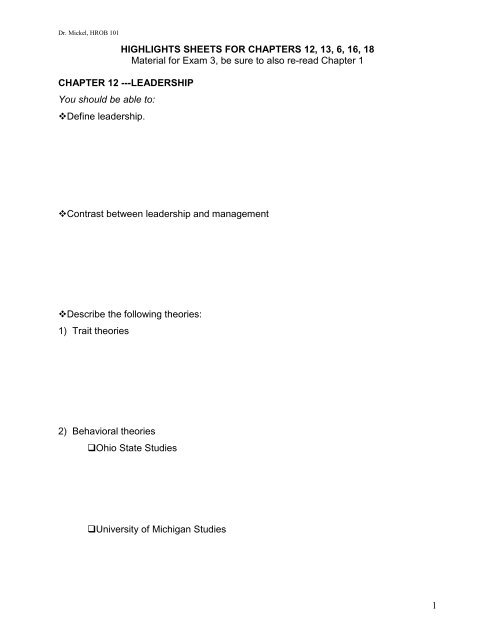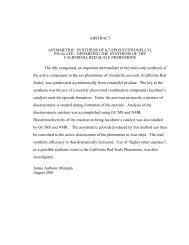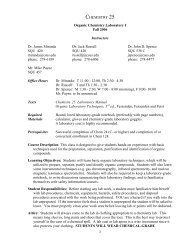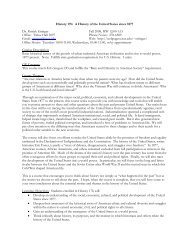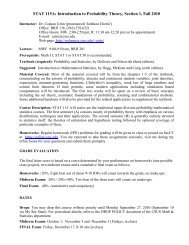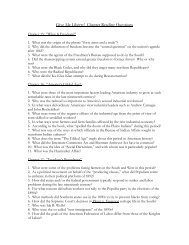Dr. Mickel, HROB 101
Dr. Mickel, HROB 101
Dr. Mickel, HROB 101
You also want an ePaper? Increase the reach of your titles
YUMPU automatically turns print PDFs into web optimized ePapers that Google loves.
<strong>Dr</strong>. <strong>Mickel</strong>, <strong>HROB</strong> <strong>101</strong>HIGHLIGHTS SHEETS FOR CHAPTERS 12, 13, 6, 16, 18Material for Exam 3, be sure to also re-read Chapter 1CHAPTER 12 ---LEADERSHIPYou should be able to:Define leadership.Contrast between leadership and managementDescribe the following theories:1) Trait theories2) Behavioral theoriesOhio State StudiesUniversity of Michigan Studies1
<strong>Dr</strong>. <strong>Mickel</strong>, <strong>HROB</strong> <strong>101</strong>3) Contingency theoriesFiedler ‘s Contingency ModelSituational Leadership TheoryPath-Goal Theory2
<strong>Dr</strong>. <strong>Mickel</strong>, <strong>HROB</strong> <strong>101</strong>3
<strong>Dr</strong>. <strong>Mickel</strong>, <strong>HROB</strong> <strong>101</strong>Leader-member Exchange Theory4) Inspirational approachesCharismatic LeadershipTransformational Leadership Authentic leadersEthics and leadership4
<strong>Dr</strong>. <strong>Mickel</strong>, <strong>HROB</strong> <strong>101</strong>Leadership and trustDefine trust and the 3 key characteristics in developing trustDescribe importance of trust and leadership—consequences of trustDescribe contemporary leadership rolesmentoringChallenges to leadership constructAttribution theory of leadership5
<strong>Dr</strong>. <strong>Mickel</strong>, <strong>HROB</strong> <strong>101</strong>Substitutes and neutralizers to leadershipOnline leadershipCHAPTER 13—POWER AND POLITICSYou should be able to:Define power and dependency.Describe the formal bases of powerCoerciveRewardLegitimate6
<strong>Dr</strong>. <strong>Mickel</strong>, <strong>HROB</strong> <strong>101</strong>Describe the personal bases of powerExpertReferentIdentify the three characteristics of resources which create dependencyDefine power tactics and identify 9 power tactics7
<strong>Dr</strong>. <strong>Mickel</strong>, <strong>HROB</strong> <strong>101</strong>Define political skillExplain how power contributes to sexual harassmentGive examples of legitimate and illegitimate political behaviorIdentify both individual and organizational factors that influence political behavior.8
<strong>Dr</strong>. <strong>Mickel</strong>, <strong>HROB</strong> <strong>101</strong>Describe how employees may respond to organizational politics (Exhibit 13-4).Describe impression management and identify 8 impression management techniques.Discussion topics:Describe situations where people appropriately use power and situations wherepeople abuse power.CHAPTER 6, 13—ETHICSYou should be able to: Define ethical dilemmas9
<strong>Dr</strong>. <strong>Mickel</strong>, <strong>HROB</strong> <strong>101</strong> Understand the three ethical decision criteria (Chap 6).Individuals are faced with ethical dilemmas frequently. How do power and politicscontribute to ethical dilemmas?CHAPTER 16—ORGANIZATIONAL CULTUREYou should be able to:Define organizational culture.Describe what dominant culture, subcultures, and core values are.10
<strong>Dr</strong>. <strong>Mickel</strong>, <strong>HROB</strong> <strong>101</strong>Describe and give examples of strong cultures.Discuss the benefits of a strong organizational culture.Discuss the dysfunctional aspects of culture (culture as a liability).11
<strong>Dr</strong>. <strong>Mickel</strong>, <strong>HROB</strong> <strong>101</strong>Discussion topics:How cultures are created and sustained?How do employees learn about a culture?What are the three stages of a socialization process?12
<strong>Dr</strong>. <strong>Mickel</strong>, <strong>HROB</strong> <strong>101</strong>What are the advantages and disadvantages of matching people with a culture?In general, how do you create ethical, positive, and spiritual cultures?CHAPTER 18—STRESS MANAGEMENTYou should be able to:Define stress, challenge stressors, and hindrance stressors.13
<strong>Dr</strong>. <strong>Mickel</strong>, <strong>HROB</strong> <strong>101</strong>Identify the potential sources of stress (Note: Stress is additive!)Environmental, organizational, and individual factorsDescribe the consequences of stress.Physiological, psychological, and behavioralDiscussion topics:Why do people experience and handle stress differently?14
<strong>Dr</strong>. <strong>Mickel</strong>, <strong>HROB</strong> <strong>101</strong>Why is the topic of stress important to organizations?What is the relationship between stress and performance?How can individuals manage stress?How can organizations help with stress management?15


